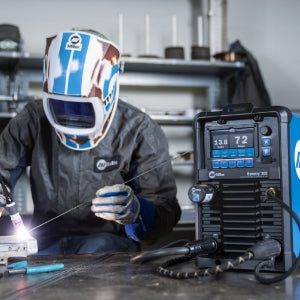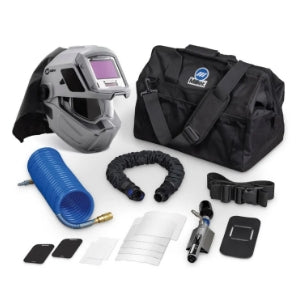 It’s throw-down time. We’ve rented out the arena. The Rocky music is blaring. It’s time to see who’s king: Inverter Tech or Transformer Based welders.
It’s throw-down time. We’ve rented out the arena. The Rocky music is blaring. It’s time to see who’s king: Inverter Tech or Transformer Based welders.
In the left corner, we’ve got the granddaddy. Transformer-based welders built America. They’ve had more than half a century of experience and refinement to be perfected into what we use today.
In the right corner, we have the up-and-coming Inverter-based welders. Only developed within the last twenty years, they’ve revolutionized the way a welding machine performs.
The Weigh In
Inverter-based technology is very lightweight in comparison to transformer welders, think Bruce Lee versus a sumo wrestler. We’re talking up to half the size of some transformer machines. If you’re doing stationary work in a big area, a large, heavy transformer machine won’t be much of a problem. But if you’re planning on transporting your welder around or space is limited, inverter tech will make life a whole lot easier.
Efficiency And Stability
Transformer welders have come a long way in the last 50 years. With a high-quality welder, you can achieve an impressive level of efficiency while maintaining a fairly stable arc. It’s nothing, however, compared to inverter welders. Many inverter welders are up to twice as efficient as their transformer counterparts. For instance, the Lincoln 160-T uses half the amperes compared to a transformer welder to reach the same amount of volts. For this reason, many inverter-based welders can run off a normal house socket so you don’t have to find a big ol’ 220V plugin or buy a generator.
For a long time, inverter welders could only supply direct current (DC). While they had a much more stable arc than normal DC transformer welders, there was only one option for AC welders. Today, inverter welders can rock both AC and DC (ah, ah, see what we did there?). Because inverters are more efficient, they can produce a more stable arc. For this reason, inverter welders take the trophy for both efficiency and stability.
Longevity
Transformers, by nature, have higher duty cycles so in theory they can handle more heavy-duty work than an inverter machine. Inverters are relatively new to the market so their long-term reliability is more speculative at this point. Right now, we know how long transformers last because they’ve been around long enough to really analyze and improve their longevity. That said, Inverter technology is incredibly intriguing because you can pack a ton of power into a small, lightweight package.
Price
Pricing between inverter and transformer tech has been a long-standing debate. When it comes to upfront cost, most transformer welders are easier on your wallet. However, in the long run, an inverter welder can save you quite a bit of cash. It all comes down to cost over time. First of all, inverter welders use less electricity. While the actual amount tends to be exaggerated, most experts agree that you’ll save about 10% on your power bill. Because of its increased arc stability, inverter welders also use less consumables and welding gas. It’s not crazy to say that an inverter welder will pay for itself over time.
So, Who Won?
That’s all up to you. Inverter welders do have advantages over transformer-based machines, but not all of these advantages might be significant for you. We’ve given you the details to really help you consider your needs and find out what’s best for you. We’ve also compiled a list of a couple of our favorite inverter and transformer welders below so you can do a side by side comparison for yourself.
Inverter
Miller Dynasty 200 DX TIG Welder
Transformer





